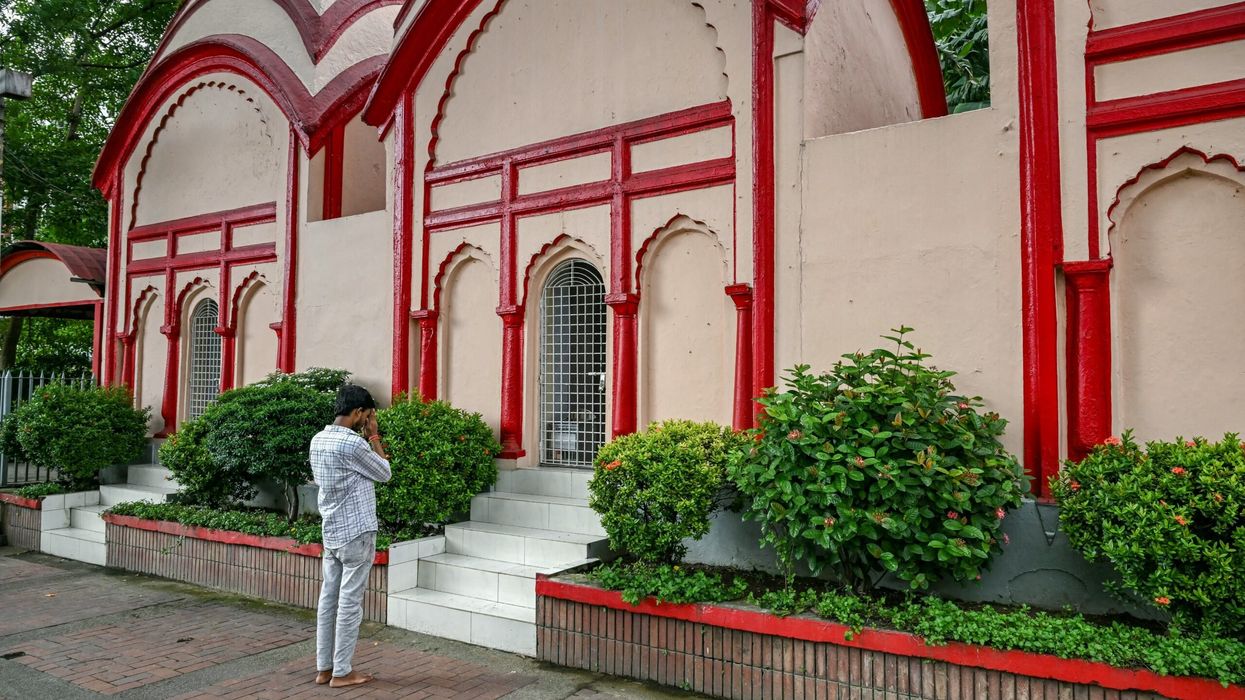THE DEITY of the ancient Dhakeswari Temple in Dhaka is seen as a "mother to all humans," according to a priest who described how Hindus, Muslims, and others from the local community came together to guard the shrine following the fall of the Sheikh Hasina government in Bangladesh.
The centuries-old temple, located in old Dhaka, is surrounded by several mosques, and the sounds of temple bells often merge with the 'azaan' from nearby mosques. During a visit to the Sree Sree Dhakeswari National Temple on Friday, PTI interacted with priests and Hindu community members who frequent the temple.
Ashim Maitro, one of the main priests who has served the temple for 15 years, emphasised that people of many religions visit the shrine. "Maa (Goddess) is mother to all humans, whether they are Hindus, Muslims, Christians, or Buddhists. They come here for solace, prosperity, and mental peace," Maitro told PTI.
On August 5, when anti-government protests peaked, leading to the ousting of the Hasina government, Maitro was at the temple. He recalled being concerned for the safety of the temple and its deities. "The temple committee members were also present, and we closed the doors and the main gate," he said.
Maitro explained that with no police presence at the time, members of the local communities, including Muslims, Hindus, and others, came together to stand guard outside the temple. "Nothing untoward has happened here from that day till today," he said with relief.
On that day, the temple continued its regular puja without interruption, and the 'bhog' has been offered daily according to the rituals. The shrine remains open to visitors from 7 am to 2 pm and 4 pm to 9 pm.
A banner has been put up at the temple’s main gate and in a courtyard, bearing messages in Bengali that offer prayers for those who died during the recent student-led protests and wishes for the speedy recovery of those injured.
During the movement, most Hindus stayed home, leading to a thin presence at the temple. However, the number of visitors is now gradually increasing, with more people attending last Friday than the previous one, according to Maitro.
People from various religious backgrounds, including Hindus, Muslims, Christians, and Buddhists, visit the temple, and while there is no restriction, visitors must adhere to the timings. Maitro also mentioned that people from outside Dhaka, including those from India, frequently visit the temple.
An interim government led by Nobel laureate Muhammad Yunus was sworn in on August 8 following the dissolution of Parliament, a move demanded by the Anti-Discrimination Student Movement. Yunus visited the Dhakeswari Temple on August 13 and interacted with the Hindu community.
Maitro recalled Yunus’s visit, stating that the Nobel laureate was welcomed with the beating of the 'dhak,' and spent about 20-25 minutes at the temple, paying respect to the deity.
Since the formation of the interim government, police personnel have been deployed at the temple premises, and their presence has steadily increased. "Police are now here day and night," Maitro said, adding that things feel normal again, with about 1,000 people visiting the temple daily.
Maitro, born in 1971, the year of Bangladesh's independence, conveyed a message to the Indian government, stating that the Hindu community remains well in Bangladesh, and to the Hindu community in India, he emphasised the need for peace and brotherhood.
Sajeeb Karr, a Hindu community member who visited the temple with his wife to seek blessings for their two-month-old daughter, also mentioned that "it feels normal now." Another regular visitor to the temple expressed that she finds mental peace at the shrine.
Members of the Hindu community gather at the Dhakeswari Temple to celebrate Durga Puja and other festivals, with preparations currently underway for Janmashtami on August 26. The interim government’s religious affairs adviser and law adviser, Asif Nazrul, and information adviser, Nahid Islam, are expected to visit the temple for the celebration.
Maitro noted that despite the political changes, priests continue their work regardless of which party is in power, as they remain focused on their religious duties.
(With inputs from PTI)




